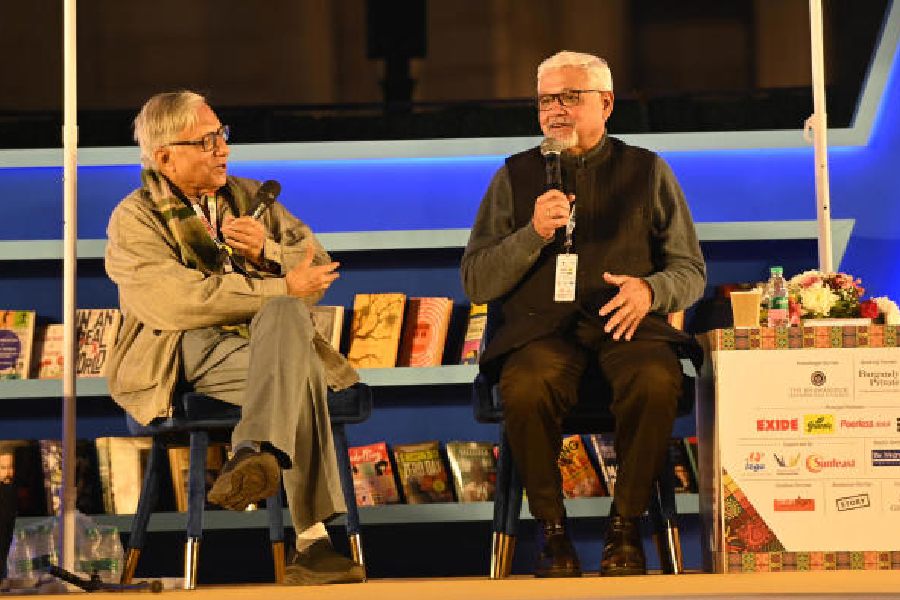Yesterday’s development is today’s disaster.
Author Amitav Ghosh and academic Sukanta Chaudhuri on Wednesday discussed how most crises the planet is going through were the consequence of some kind of intervention that was in the past considered a work of genius.
“We are now living through a planetary crisis at so many levels. Almost every single one of these is actually the unintended consequence of some kind of intervention that was at the time thought of as a great thing,” Ghosh said at a session titled “The resource curse” on Day II of the Tata Steel Kolkata Literary Meet, in association with the Victoria Memorial Hall and The Telegraph.
It was houseful at the venue. The showers picked up steam as the session progressed. The Son Et Lumiere was covered but the conditions were chilly. The audience, however, stayed put.
Ghosh, who has written fiction, historical novels and non-fiction on colonialism and climate change, and Chaudhuri, literary scholar and professor emeritus at Jadavpur University (JU), discussed at length the Sunderbans, the mangrove delta spread over 10,000sqkm across India and Bangladesh that is threatened by rising sea level and sinking every day.
Chaudhuri spoke of places like Gosaba, on the periphery of the Sunderbans, which were colonised by Daniel Hamilton, a Scotsman who settled in the islands in the early 20th century and is credited with introducing several progressive measures for the uplift of the residents.
“The outermost wall of habitation, (areas like Gosaba, Rangabelia and Satjelia) were colonised under — by the standards of the time — the very benevolent and progressive rule of Hamilton.... This may already have been a pinpoint whereby what should have been the barrier zone of the Sunderbans was inhabited. Because of the damage thereby done to the mangroves which were helping to keep, inter alia, Kolkata protected, that buffer began disappearing. This process, combined with global warming and the rise of sea level, is becoming a very grave problem,” said Chaudhuri.
Ghosh said Hamilton was an “old-fashioned colonist” in “trying to reclaim what he thought was wastelands”.
“He was settling these lands with various poor farmers and fishermen that he drew in from various parts of the country. I don’t know if the long-term legacy is at all defensible because really those areas should not have been inhabited. In fact, the descendants of those people are already having to retreat.”
Chaudhuri called Hamilton an “enlightened colonist”.
He was not “in any direct sense, exploiting the people he settled there”.
“Rather, he tried to spread the cooperative movement among them. He spent a good part of his considerable fortune over the area.... It is just a matter of what you regard as development in one era proving to have disastrous consequences three generations down the line,” Chaudhuri said.
Ghosh agreed: “Absolutely. That is the story of our world.”
He cited examples in India and Bangladesh.
“In Bangladesh, the British built these embankments. Now, those embankments are proving to be an absolute disaster in the long run. The British borrowed these models from the Dutch. The Dutch are amazing etcetera.... But their main river, the Rhine, carries 1 per cent of the silt that is carried by the Ganges-Brahmaputra river system. So, how can you expect a solution that is possible in Holland to be possible in Bangladesh,” he said.
Ghosh dubbed the Farakka barrage an “environmental catastrophy, for West Bengal as well as for Bangladesh”.
Chaudhuri asked what would have happened had the barrage not existed.
“The Meghna would not have dried up.... Every time there is a flood, the Farakka barrage releases huge quantities of water, which thereafter cause floods in Bangladesh. A lot of silt has stopped, lots of movement of fish has stopped. But most of all, sooner or later, the Ganga is going to bypass Farakka, because that’s what it does. Then the barrage would be useless anyway,” said Ghosh.
These are all the “unintended consequences of interventions that were once thought to be works of great genius”, he said.
